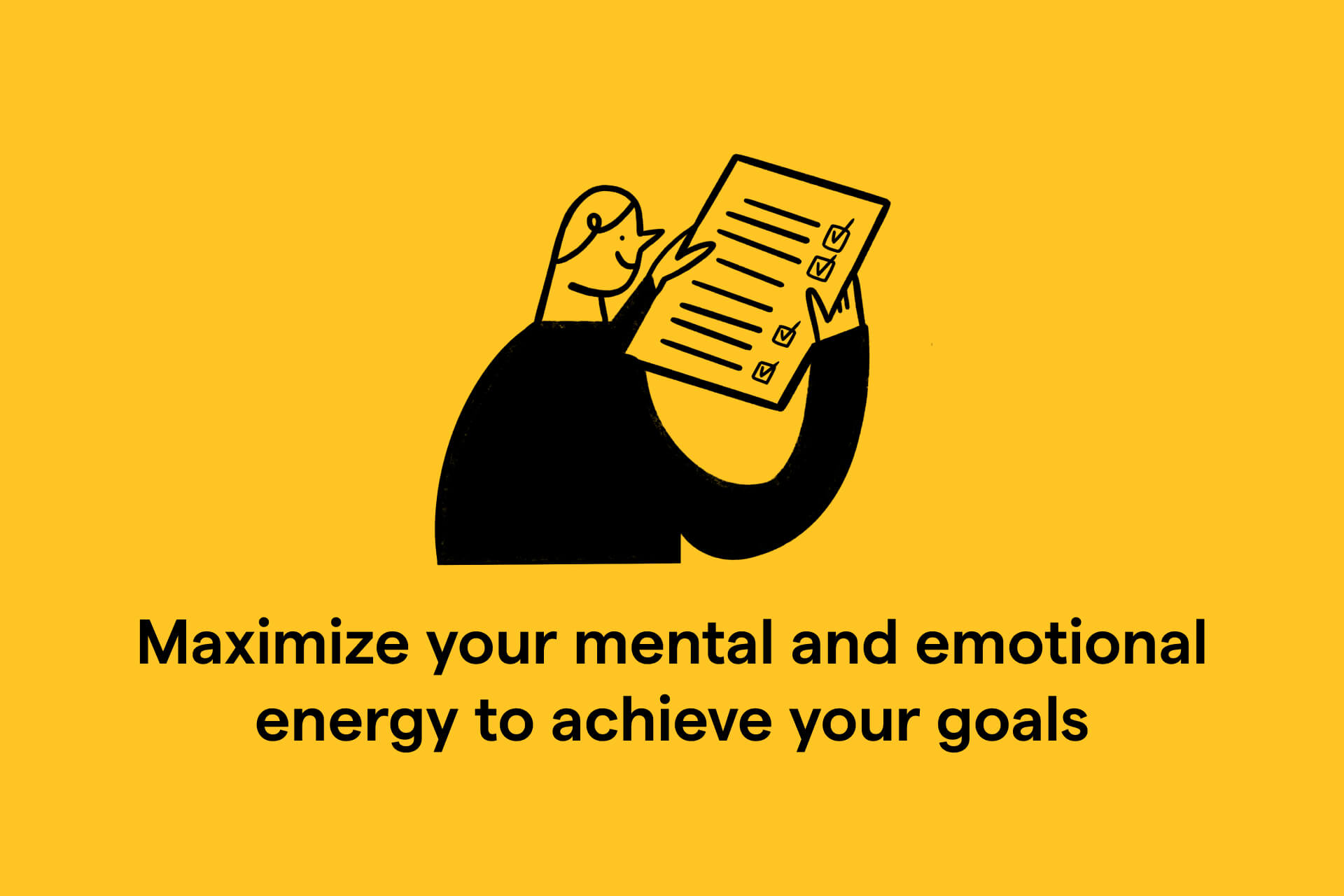
Individual
A self-facilitated program to boost your mental fitness for personal and professional growth
This website will offer limited functionality in this browser. We only support the recent versions of major browsers like Chrome, Firefox, Safari, and Edge.

Select the experience that fits your needs

A self-facilitated program to boost your mental fitness for personal and professional growth

A self-facilitated mental fitness program with exclusive pricing for 2 to 25 individuals

Explore coach-led mental fitness programs with workshops tailored to your organization
Mental Fitness

Productivity is more than just a skill; it’s a strategic advantage. Whether you’re part of a professional team juggling multiple tasks or an individual seeking to make the most of each day, maximizing your productivity is fundamental to achieving your goals.
The foundational step in optimizing productivity is recognizing and addressing your Saboteurs – those negative, internal voices that tend to guide you toward draining activities. Once you’ve identified these Saboteurs and recognized how they show up in your day-to-day life, you can learn to shift your mindset away from Saboteur-driven decisions.
Conversely, your Sage, or your positive self, enables you to handle challenges with a clear and calm mind. Your Sage uses five primary powers: Empathize, Explore, Innovate, Navigate, and Activate. These powers are critical to approaching tasks with a positive and constructive mindset. Here are some examples of the gifts you can generate with a Sage approach to productivity:
Empathy: Cultivating empathy toward yourself and others allows you to navigate challenges with a compassionate mindset. Instead of succumbing to self-criticism or blame, approaching tasks with understanding fosters a more productive environment.
Curiosity: Embracing curiosity opens the door to continuous learning and growth. Rather than viewing tasks as burdens, adopting a curious mindset transforms them into opportunities for exploration and development.
Creativity: Infusing creativity into your approach to work enhances problem-solving and innovation. The Sage mindset encourages you to think outside the box, generating fresh ideas and solutions.
You may be familiar with The 7 Habits of Highly-Effective People® and its Four Quadrants of Time:
1. Urgent and important
2. Not urgent, but important
3. Urgent, but not important
4. Not urgent and not important
This functional matrix can help you categorize tasks based on their impact and urgency. It can also steer you away from energy-draining activities and toward more impactful and energizing tasks.
Time is a finite resource, and how you allocate it significantly impacts your overall productivity. Rebalancing time allocation involves carefully evaluating tasks and a strategic shift toward high-impact and high-energy activities.
Think about how you allocate your time across different activities. Evaluate the mix of tasks and identify high-impact and high-energy activities. These are the tasks that deserve your greatest focus.
Which tasks do you perceive as low-impact and draining? These are the tasks you want to deprioritize. Remember, optimizing your time is an ongoing process. Continuous evaluation ensures that time allocation aligns with your evolving goals and priorities.
The beauty of this approach lies in its versatility. You can apply it to all aspects of your life. By analyzing how you spend your waking hours in various life domains, you’ll gain insight into how to rebalance time in your personal and professional endeavors.
Not all tasks align with your strengths, so it’s essential to identify which tasks you can delegate or trade. Consider delegating tasks that are important but draining to you. You’ll find that others may see these tasks as energizing, creating a win-win situation. If you work in a team setting, look for tasks you can trade with team members. Trading tasks can reduce the overall energy drain on the team and increase output.
Once you’ve rebalanced your time allocation, shift your focus to how you can use that time most effectively. There are three strategies for optimizing your use of time:
1. Using the Proper Sage Power: Identifying and leveraging the suitable Sage Power to accomplish the task at hand will help you maximize your mental and emotional energy.
2. Charging the PQ Brain: Engaging in PQ Reps charges up your PQ brain, ensuring access to the right Sage Powers for the task. A PQ Rep is a 10-second hyper-focus on one of your five senses. Doing PQ Reps is a foundational practice for building mental fitness and helping you overcome self-sabotage.
3. Single-Tasking: Single-tasking requires less energy than multi-tasking, allowing you to get more done. By dedicating your full attention to one task at a time, you enhance your focus and quality of work.
Too often, people need to allocate more time for important but not urgent tasks. These tasks fall into the quadrant of things that can prevent future crises. However, these tasks tend to be neglected because they don’t demand immediate attention.
Some examples of important but not urgent tasks include preventive healthcare procedures or long-term business development activities. Allocate intentional time to the tasks in this quadrant to prevent the burnout that is caused by constantly addressing urgent but not important matters.
A critical aspect of optimizing your productivity is recognizing the signs of burnout and preventing it. Here are three things you can do to take preventive measures to avoid burnout:
1. Rebalance Your Time Allocation: Take another look at your time allocation. If you spend a significant portion of your time on draining activities, this is a sign you need to rebalance.
2. Shift Job Responsibilities: If you’re experiencing burnout in your current role, consider shifting your responsibilities to align with your strengths and passions.
3. Job Fit Evaluation: In some cases, burnout may stem from a fundamental mismatch between you and your job. A different role or career path may provide a more suitable and fulfilling work environment.
The final piece of the productivity puzzle is cultivating important but not urgent habits. Observe the areas of your life where you consistently deal with last-minute crises. These areas hold the clues to the foundational, proactive changes you can make to prevent future problems. As you seek to establish sustainable productivity, important but not urgent habits will pave the path.
By shifting from Saboteur to Sage, rebalancing your time allocation, and optimizing your use of allocated time, you can unlock a new level of efficiency and fulfillment. As you apply these principles to your professional and personal life, you’ll get more done and enjoy more meaningful and impactful outcomes.
Get started by taking the free Saboteur Assessment to discover which Saboteurs impact your productivity.

